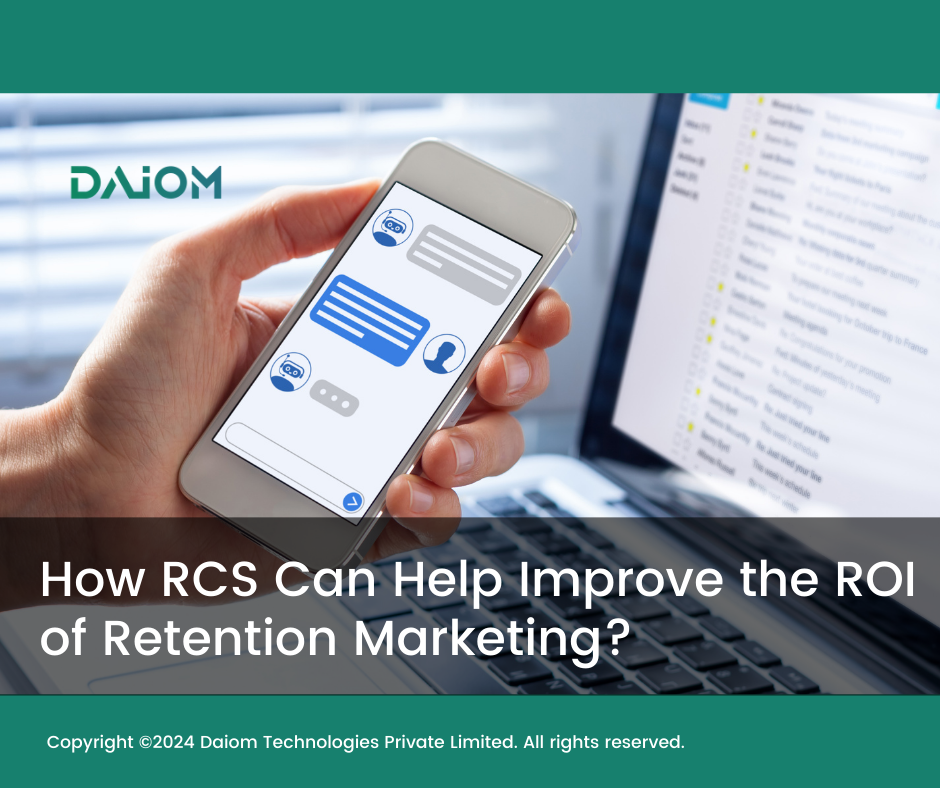As businesses look forward to providing a SIMPLE AND EASY customer experience across every vertical, they seek OMNICHANNEL strategies to help them achieve their goals.
Previously, marketers relied on traditional SMS for communication, but its reach was limited. WhatsApp offers a superior alternative, but its higher costs can strain marketing budgets.
RCS emerges as a fruitful solution, providing similar features to WhatsApp at a fraction of the cost—about one-quarter of WhatsApp’s expense—making it a budget-friendly option for effective marketing. By reducing the marketing budget and making marketing experiences smooth and consistent, brands can boost the chances of customers making a purchase and drive revenue. And, one essential component of an effective omnichannel strategy is the integration of RCS messaging.
RCS stands for Rich Communication Services and it is a new form of messaging by Google that is still in the early stages. It offers an enhanced messaging experience that goes beyond traditional SMS and instant messaging apps.
Compared to MMS and SMS, RCS offers a multitude of features like rich media messages, typing indicators, read receipts, delivery reports, group chats, location sharing, and rich cards.
Integrating RCS into an omnichannel business strategy helps businesses offer a smooth and consistent experience across all customer interactions.
Whether customers connect through social media, email, or SMS, RCS can greatly improve the customer experience by making messaging more engaging and interactive. Businesses can send personalised messages, interactive product catalogs, appointment reminders, and even video messages. This boosts customer engagement and helps build stronger relationships and brand loyalty.
In this blog, we will understand what RCS is, its aspects, functions and its potential impact on the future of communication.
Communication is the only task you cannot delegate.
Roberto Críspulo Goizueta, former Coca-Cola CEO
Table of Contents
- The Purpose Behind RCS: Why It Was Created?
- Why Your Business Can’t Afford to Overlook RCS?
- How Industry Leaders Are Winning Big With RCS?
- How Does RCS Help In Optimising Retention Marketing Budget?
- Must-Know Features of RCS
- Shortcomings of RCS That Are Addressed
- RCS Vs WhatsApp
- RCS Vs SMS Vs WhatsApp
- How Can RCS Benefit You In Your Omnichannel Strategy?
- Conclusion
1. The Purpose Behind RCS: Why It Was Created?
Rich Communication Services (RCS), is an advanced messaging service that helps in improving the default functionality of SMS, and it started in 2007 when mobile operators wanted to compete with OTT channels. (OTT stands for “over the top” as they are channels in addition to – or “on top” of – primary messaging channels.) RCS was meant to be a new channel to keep carrier-based messaging relevant in the era of OTT applications.
Gradually, in 2008, GSMA, a group of mobile operators worldwide, started working on RCS. They tried to launch it in different places but couldn’t cover the whole world.
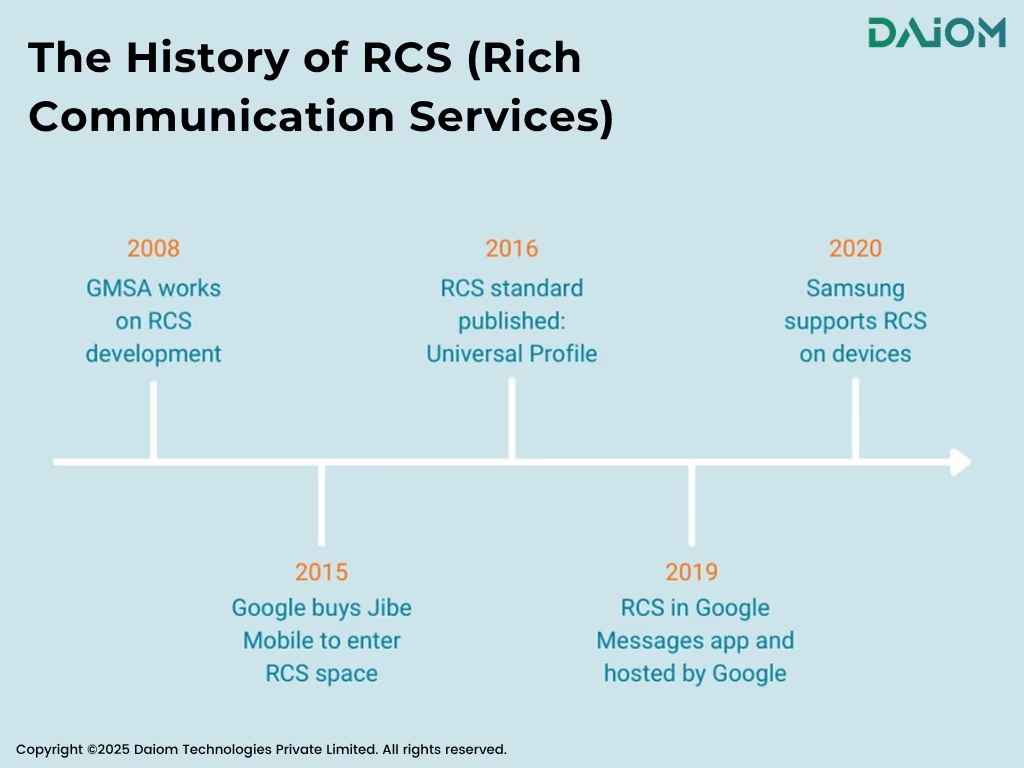
Then, in 2015, Google wanted to compete with Apple iMessage. They joined GSMA and bought Jibe Mobile, an RCS services provider, to help bring RCS to Android phones.
After 2016, Google provided the same solution for free in P2P cases. This initiative was taken so that people could reach families and friends across the globe.
But, there was a challenge!
There was a need for agreement between the operators in every country and Google. Without an agreement, RCS would not be available.
For A2P cases, RCS Business Messaging (RBM) was created.
To solve this problem, in 2019, Google announced that RCS would be formally launched in the Google Messages app and will be hosted by Google itself instead of the user’s carrier. However, RCS Business Messaging (RBM) support still needed an agreement between Google and end users’ operators.
Ultimately, in 2020, Samsung supported Google chat (RCS) on their devices, which previously had the only supported operator driven RCS.
2. Why Your Business Can't Afford to Overlook RCS?
In today’s business world, strong customer experience is the biggest growth driver. Engaging with customers in the right way is everything. It shares a massive chunk of customer satisfaction, growth and revenue.
With the rise of social media and mobile communication, customer expectations have changed. One of the most common trends in today’s mobile communication is the emerging adoption of RCS Business Messaging.
Businesses of today need to communicate where their customers prefer to be reached.
RCS is an innovative messaging service, as discussed above, that paves the way for businesses to correctly engage with customers in a more immersive and personalised way than ever before. How?
- Messages are delivered straight to the customer’s inbox, just like an SMS.
- RCS offers more features, similar to WhatsApp or Messenger.
- There is no need to sign up, unlike WhatsApp or Messenger.
- It provides a branded experience like a mobile app.
- RCS shows which contacts use the platform.
- RCS includes detailed reports with delivery receipts and message stats.
3. How Industry Leaders Are Winning Big?
In the near future, it’s estimated that 86% of smartphones will be RCS-enabled, allowing your brand to reach consumers in all kinds of new ways. Considering its importance, many industry leaders have chosen RCS as their communication channel over WhatsApp as the cost of RCS is 1/4th of that of WhatsApp.
These Indian brands like My11Circle, NoBroker, Porter, HDFC Bank and Usha are already leveraging the most of RCS Messaging to provide a personalised experience to their customers with rich-media included messages with a customized link-preview. Their customers can seamlessly avail their products and services through one tap from their inbox itself.
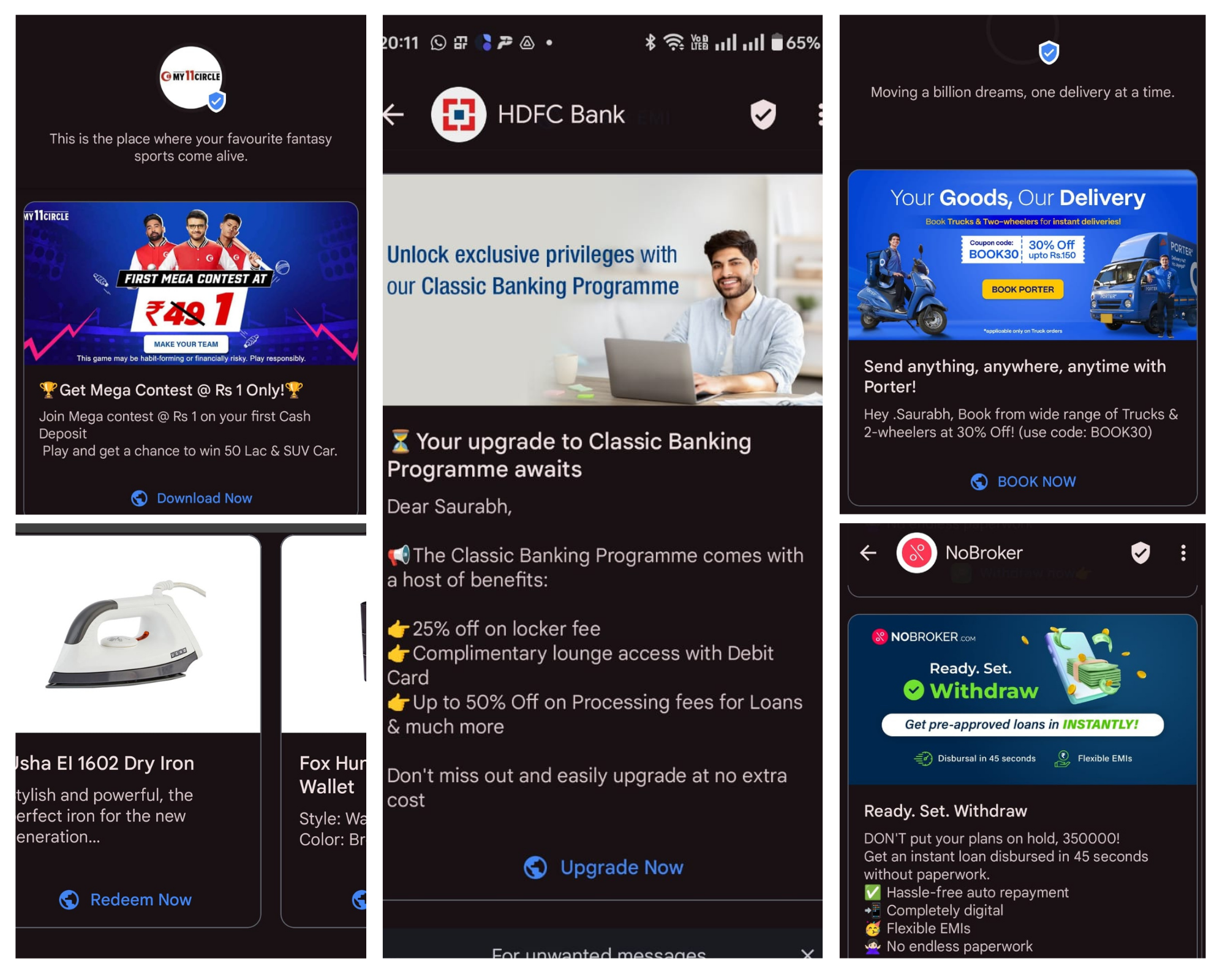
Here is an example of Best Buy using RCS business to prompt customers to start scrolling and shopping through the carousel of coupons and sales.
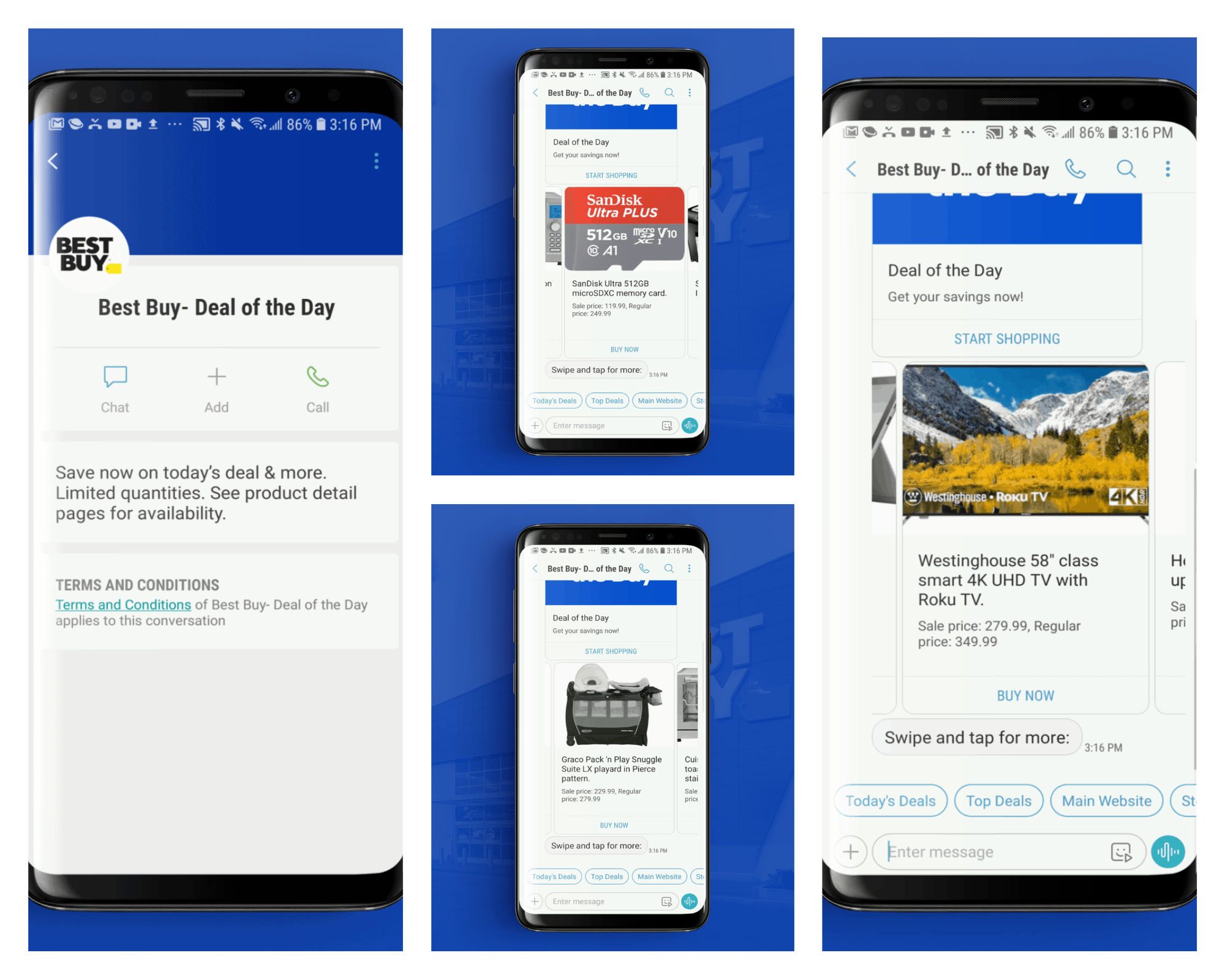
- Upon entering their landing page, customers receive a “Deal of the Day” offer that highlights the Best Buy brand and their current promotions.
- After initiating the first contact, customers can easily swipe through multiple deals, like heavy discounts on electronics.
- They can also scroll through offers and click on options like “Top Deals” or “Main Website.”
- Clicking on “Buy Now” can make purchases directly from the messaging app itself, streamlining the overall buying process and improving the user experience.
Apart from this, Best Buy also sends multiple deals based on the product category and day, offering uniqueness, variety and relevance to their customers.
4. How Does RCS Help In Optimising Retention Marketing Budget?
Customers today expect quick and easy interactions. They control devices with apps and get personalised social media feeds. They want the same smart and personal touch in business messages.
While SMS works, RCS Business Messaging (RBM) is even better for engaging customers.
In the Omnichannel landscape, many brands are already benefiting from adopting RCS as it helps streamline the processes and reduce costs while also increasing efficiency, thereby optimising their overall customer retention budget.
One Major advantage that exists with RCS is that it costs ¼ the amount per conversation when compared with WhatsApp. This is a big benefit for marketing.
Messages can significantly cut down the costs of customer service, while the cost of an RCS conversation is usually no more than two A2P SMS messages. Some marketers have seen campaigns with a 100% increase in click-through-rate compared to SMS equivalents, and a 200% increase compared to email.
But, how does it help? This image from Google shows the exact potential of RCS for businesses!
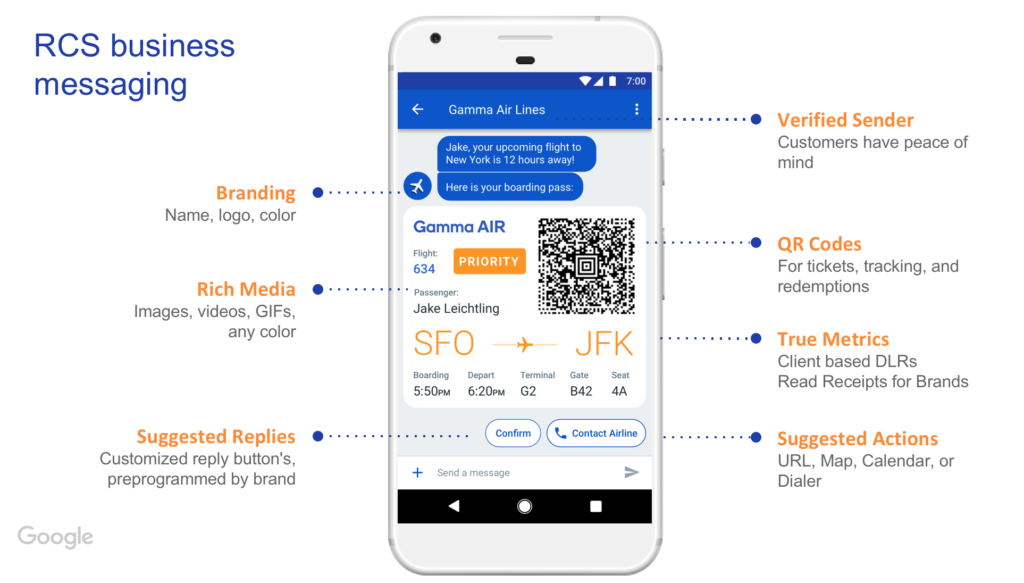
- Using messages with photos helps generate a higher CTR. Images result in a 52% higher click-through rate.
- With quick-reply options, brands can streamline the decision-making process for consumers and guide them towards specific actions.
- The use of button CTAs can increase conversions by over 32%.
Moreover, RCS provides useful read data, letting your business see how many people read your messages. This, combined with RCS’ inherent two-way communication features, can help create a sense of trust and encourage action, such as making a purchase, hence optimising overall customer retention experience.
5. Must-Know Features of RCS
Here’s why more brands are exploring RCS messaging to level up their customer communication:
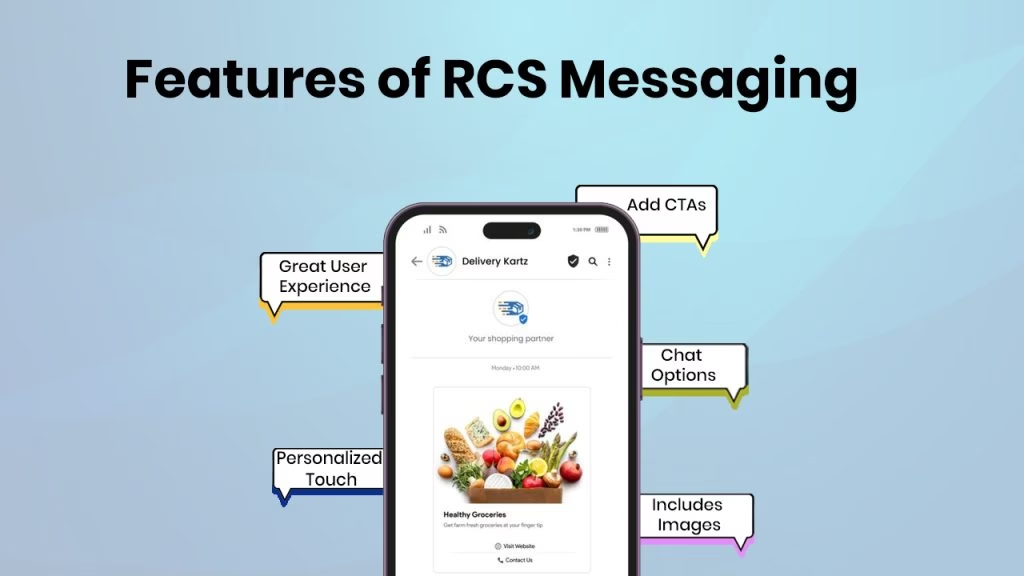
- Multimedia Capabilities: Brands can use images and interactive content instead of just text.
- Read Receipts: Checking if customers read your messages is easy with RCS.
- Real-Time Responsiveness: Replying to customers quickly is possible through RCS.
- Brand Customization: Adding brand logo and colours to messages is easy breezy.
- Chatbot Integration: Brands can also use chatbots to handle routine tasks and answer questions.
As a company grows, communication becomes its biggest challenge.
Ben Horowitz, General partner of Andreessen Horowitz
6. Shortcomings of RCS That Are Addressed
RCS is priced higher than traditional SMS but significantly lower than WhatsApp. However, a major challenge for marketers is its limited reach.
Unlike SMS, which is universally available, RCS’s adoption varies by region and depends on carrier support and device compatibility, making it less accessible to all potential customers.
While it’s available on Android devices, including Samsung Galaxy S series, Apple’s iPhones don’t fully support RCS yet, further restricting its effectiveness and reach.
Apple is expected to start supporting RCS in their , which could improve its effectiveness and reach. They have already added support for Rich Communication Services (RCS) to its Messages app and the feature arrived as part of the second developer beta of iOS 18.
This limited reach is currently restrict the effectiveness of RCS campaigns compared to more widely used messaging platforms.
7. RCS Vs WhatsApp
Here is a comparison of RCS Business Messaging and WhatsApp Business on features, cost, security, and other important factors to help you pick the best way to engage with your customers as marketers.
Features:
- WhatsApp: Sends images, videos, shows read receipts, typing notifications, and supports group chats.
- RCS: Similar features as WhatsApp, plus branded messages and verified sender options.
Cost:
- WhatsApp: Costs vary, often higher depending on provider and region.
- RCS: Usually more cost-effective than WhatsApp.
Adoption:
- WhatsApp: Widely used, but needs to be downloaded; usage varies by region.
- RCS: No app needed for Android; coming soon to iPhones.
Security:
- WhatsApp: End-to-end encryption keeps messages private.
- RCS: Encrypted during transit; sender verified by Google and telecoms.
Payments:
- WhatsApp: Payments available in India, Brazil, and part of Singapore.
- RCS: Can support payments globally through Google Wallet or other payment systems.
Chatbot Support:
- WhatsApp: Strong marketing support with many tools for building chatbots.
- RCS: Improved support; businesses can start messages and use chatbots.
Suitability for Conversations:
- WhatsApp: Great for interactive, two-way conversations with rich media.
- RCS: Also good for interactive, two-way conversations with rich media.
WhatsApp offers advanced tools and massive use but can be costly and region-specific.
RCS is more cost-effective, doesn’t require an app for Android, and will soon be on iPhones. It also supports global payments and strong security.
Using both can help you take advantage of their unique benefits.
8. RCS Vs SMS Vs WhatsApp
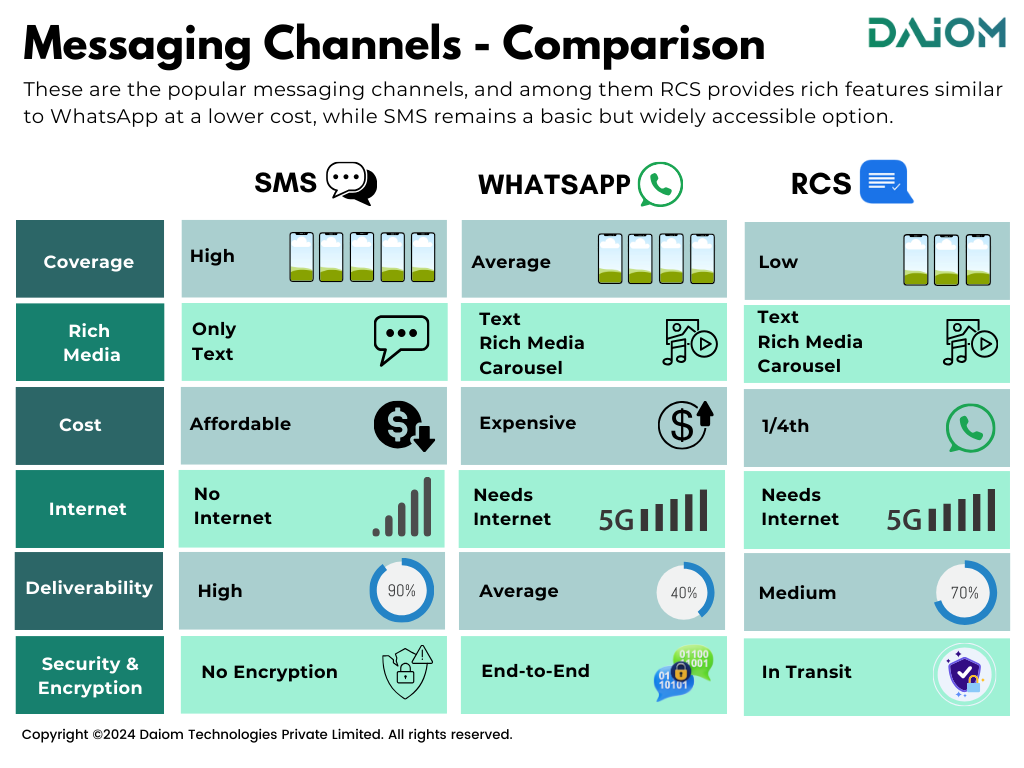
Choosing the right messaging platform can make a big difference. Let’s compare SMS, WhatsApp, and RCS to see how they stack up.
Rich Media: Want to share more than just text? Here’s what each platform offers.
- SMS: Only text, no images or videos.
- WhatsApp: Text and rich media like videos.
- RCS: Text, images, and videos.
Cost: Keeping your budget in check is crucial. Here’s how much each option costs.
- SMS: Cheap and affordable for everyone.
- WhatsApp: Expensive, costs more than SMS.
- RCS: Costs 1/4th of WhatsApp.
Internet Connection: Not every platform needs the internet. Let’s see how they compare.
- SMS: Works without the internet.
- WhatsApp: Needs internet to work.
- RCS: Doesn’t need internet.
Deliverability: Getting your message delivered is key. Check out the success rates.
- SMS: High, 90% messages get delivered.
- WhatsApp: Average, 40% messages get delivered.
- RCS: Medium, 70% messages get delivered.
Security & Encryption: Security matters when messaging. Here’s how secure each platform is.
- SMS: No encryption, less secure.
- WhatsApp: End-to-end encrypted, very secure.
- RCS: Encrypted in transit, secure.
Making the right choice depends on your needs. Whether it’s cost, media sharing, or security, there’s a platform that fits your goals.
9. How Can RCS Benefit You In Your Omnichannel Strategy?
Integrating RCS messaging into your omnichannel strategy can give you a powerful edge for enhancing your overall customer experience.
With personalised messaging, and streamlining customer support, you can leverage the capabilities of RCS, and build stronger relationships with your customers and improve overall business performance. Here are the areas where you can use RCS messaging in your Omnichannel Strategy:
- Enriching Customer Experience: RCS can help in improving customer interactions by making your messaging game more interesting and engaging. You can send interactive messages and product marketing catalogues, video messages, appointment reminders and what not. Overall, it provides you with a richer experience that can help in boosting your brand loyalty and enrich stronger customer relationships.
- Analysing Customer Data: You can use RCS for personalisation using customer information for creating tailored messages. Data evaluation like purchase history, browsing habits, and location can help your business send more customised and relevant messages. For example: a cookie store can send new offers based on the customer location and past purchases. It is an approach that will help customers appreciate the information with offers, thereby matching their choices.
- Streamlining Customer Support: RCS can help your business improve customer support by helping you send interactive menus and multimedia messages. Your customers can send you videos and snapshots for explaining problems effectively. It gives rise to an increased marketing efficiency in helping resolve problems, hence contributing to better customer satisfaction. Thus, in turn, your business can build a great reputation for better service.
10. Conclusion
Customers usually expect genuine, personalised, meaningful, and transparent communications from companies.
While both WhatsApp and RCS are extremely effective channels and are closely matched when it comes to the features available to users, you don’t have to choose between RCS and WhatsApp; you can use both in your omnichannel marketing strategy.
Pick the best channel for each situation based on region, customer preferences, and cost.
For more such informative blogs and posts, stay tuned to DAiOM!!!
Subscribe to our Newsletter!


